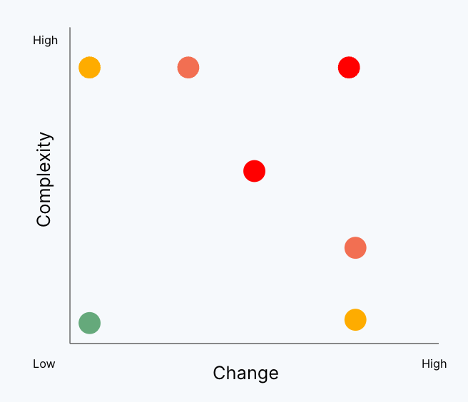|
Hi there,
I love this story told by Dallin H. Oaks …
When we don’t understand the underlying cause of a problem, we tend to come up with solutions that have no chance of success.
When we want to train new employees, we usually turn to courses and shadowing. We design a new hire training course and then we assign them to observe other more experienced employees and learn from their examples.
We are using a learning tool to help employees gain operational knowledge — all of the knowledge your employees need to fulfill requests, complete tasks, answer questions, and solve problems.
But it never works very well. Why?
The answer is change and complexity.
Look at the chart below. If your business could be represented by the green dot in the bottom left corner, low complexity and low change, then courses and shadowing will work just fine.
But, if you are at the high end of complexity, change, or both then you know how impossible it feels to help employees be confident, efficient, and independent.
The fact is you are trying to cram more information into your employees’ brains than they were ever designed to hold. You are buying melons for $1, selling melons for $1, and wondering why you aren’t making any profit.
So, what is the solution?
The first step is to recognize the root issue and solve for that issue. Recognizing the Root Issue and SolvingThere are two main root issues when it comes to knowledge transfer:
Root issue #1: I am trying to teach my employees more information than they can possibly retain due to our biological limitations.
Root issue #2: I am teaching them to memorize information that changes on a regular basis, rendering their memorized information either worthless or dangerous.
These are two issues that training and shadowing will never be able to overcome. It's like using a screwdriver to dig a 6-foot hole in your backyard. You may move some dirt, but you aren’t going to end up with a hole in a reasonable amount of time.
Once we understand the challenges we are dealing with, we then need to shift the strategy.
Stop teaching people to memorize information and instead teach them to rely on just-in-time resources that can transfer that required operational knowledge to them instantly and accurately.
That isn’t necessarily an easy thing to do, but at least when we try to solve that problem, the problem of instantly transferring knowledge instead of teaching it, we have a chance at success. But, if we just keep selling melons for $1 a melon, we are going to end up doing a lot of work with nothing to show for it in the end.
If you want to dive more into this topic, I have two resources for you:
Do these concepts resonate? Have you found ways to track the mixture of complexity and change in your organization?
If you have, please let me know. I would love to learn from your experiences.
Talk soon, Greg
|
.png?upscale=true&width=1200&upscale=true&name=The-Knowledge-Champion-Email%20(3200%20%C3%97%201400%20px).png)

